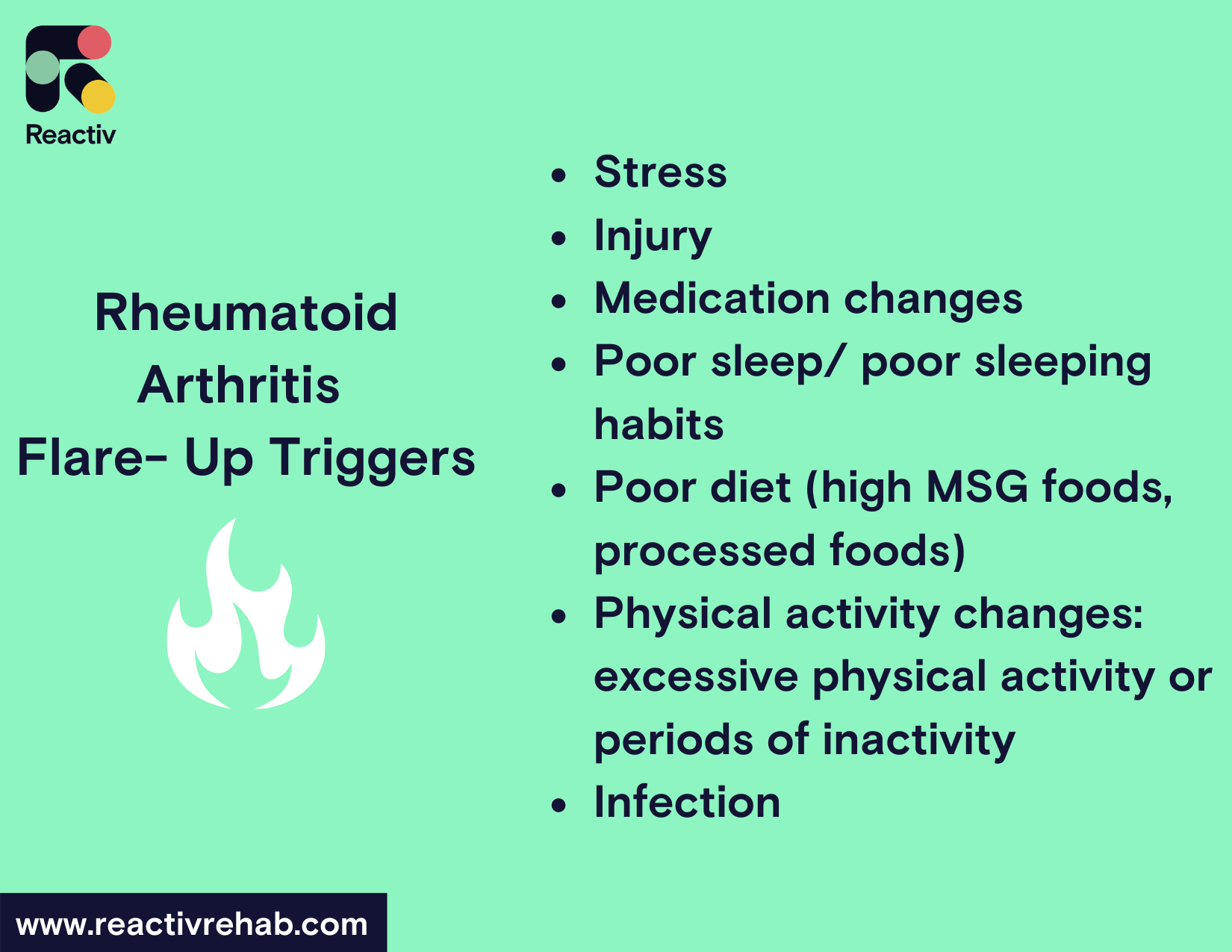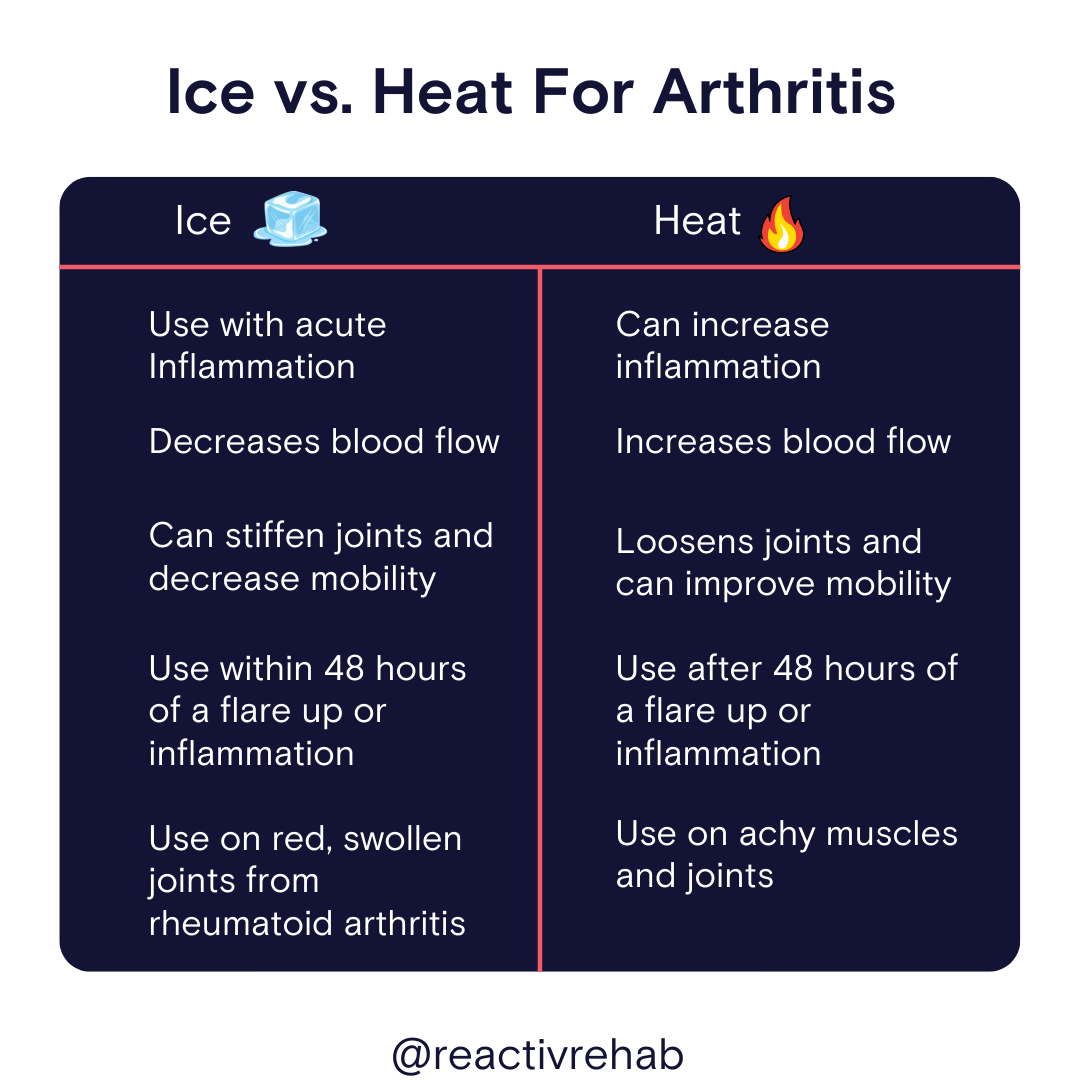
Whether you are newly diagnosed with rheumatoid arthritis (RA) or have been diagnosed for years, a flare-up can catch you off guard and can be frustrating. You could be going along with your daily life with your anti-inflammatory diet, good lifestyle habits, medication adherence, and still have a flare up. Flare ups, also known as exacerbations, are periods of increased disease activity and symptom severity.
Sometimes you may feel the onset of a flare-up with symptoms of fatigue or increased pain. Other times, you may wake up and feel sore, have swollen joints, increased onset from a seemingly acute onset with no warning. Managing rheumatoid arthritis symptoms can be a balancing act.
How to Manage a Rheumatoid Arthritis Flare-Up
👀 Identify and address the trigger: It is important to try to identify the trigger of your flare-up, as this can help you prevent future flare-ups.
Rheumatoid Arthritis flare ups can potentially be triggered by:
- Stress
- Injury
- Medication changes
- Poor sleep/ sleeping habits
- Poor diet (high MSG foods, processed foods)
- Activity changes: excessive physical activity or periods of inactivity
- Infection

To identify the trigger, start by observing the patterns of when you experience a flare-up. It can be helpful if you can keep a journal or a note of potential triggers such as what you ate, how you slept, your stress level and your activity levels. This can help you identify the pattern of the symptoms, which will help you know what potential trigger to make an adjustment to.
💊Take your medication as prescribed: It is important to take your medication as prescribed by your doctor to help control inflammation and prevent flare-ups. This may include nonsteroidal anti-inflammatory drugs (NSAIDs), disease-modifying antirheumatic drugs (DMARDs), or biologic therapies. If you are experiencing a flare-up, it may be necessary to increase your dosage or take additional medications as directed by your doctor.
🔥Apply heat or cold

Applying heat or cold to affected joints can help reduce inflammation and alleviate pain. Heat can be applied using a heating pad, warm shower or bath, or hot pack. Cold can be applied using a cold pack or ice wrapped in a towel. It is important to use caution when applying heat or cold, as overheating or overcooling can cause further damage.
Remember, although heat typically is preferred on arthritic joints but when in a rheumatoid arthritis flare up, heat may worsen the symptoms of a swollen, warm and painful joint.
🔨Use assistive devices and gadgets. These are the things that are going to reduce the stress through your joints. When you are in a flare up, you often cannot simply stop doing your daily activities. By using appropriate devices and gadgets you can reduce the pressure on your joints.
Here are some recommendations of devices and gadgets:
- Opening Jars:
- Jiffy Twist: Attaches underneath the cabinet and can help open jars of various sizes
- Shelf Liner: You can find this at any store or may even already have some lying around. Place a piece on top of a tight jar or container to help with your grip.
- Dycem: A non-skid material, helpful for improving grip on tough jars
- Supports:
- Kinesiotape (see video here and here on how to apply), Grace and Able Compression Gloves
- Other: Foam tubing to build up handles
😴 Get plenty of rest: During a flare-up, it is important to get plenty of rest. This can help to reduce inflammation and alleviate pain. It is also important to try to maintain a regular sleep schedule, as sleep can help your body recover and repair itself.
We polled people with rheumatoid arthritis on our Instagram and asked them what was the most beneficial in helping manage their arthritis flare up. 100% of people reported that rest was the MOST important for helping them get through the flare-up.
🏃♀️Exercise regularly: Regular exercise can help to reduce inflammation, improve joint function, and alleviate pain. During a flare-up, it may be necessary to modify your exercise routine or reduce the intensity of your workouts. You’ll want to find something that is gentle movement and ease into it.
For example, if you are experiencing rheumatoid arthritis flare up symptoms in your hand, try a gentle range of motion exercises like the one shown here in the Reactiv app.

This helps to gently start to move the hand and increase blood flow which can help circulate anti-inflammatory cells in the body to reduce inflammation.
🥦Eat a healthy diet: A healthy diet can help to reduce inflammation and improve overall health. It is important to consume a variety of fruits, vegetables, and whole grains, as well as lean proteins. Avoiding processed foods, sugary drinks, and saturated fats can also help to reduce inflammation.
Pro tip: Shop the perimeter of the grocery store. This is where the more fresh food is often shelved.
💧Stay hydrated: Drinking plenty of water can help to reduce inflammation and flush toxins out of your body. It is important to stay hydrated, especially during a flare-up, to help your body function optimally.
Pro tip: Try purchasing a refillable water bottle that you can keep with you throughout the day and fill up at least at every meal time.
🧘♀️Practice stress-reduction techniques: Stress can exacerbate RA symptoms and trigger flare-ups. It is important to find ways to manage stress, such as through relaxation techniques, counseling, or exercise.
🫶 Seek support: Managing a chronic illness can be overwhelming and it is important to seek support from healthcare professionals, friends, family, and others with chronic conditions.
Managing a rheumatoid arthritis flare-up can be challenging, but by following these tips and working closely with your healthcare team, you can reduce your symptoms and maintain your quality of life.
It’s important to remember that every person with rheumatoid arthritis is different, and what works for one person may not work for another. It may take some trial and error to find the best management strategies for you.
Reactiv may be able to help you manage your rheumatoid arthritis. To see if you are eligible, provide your contact details and we will reach out to you.
Disclaimer: This post is for general informational purposes only. It should not be used to self-diagnose and it is not a substitute for a medical exam, cure, treatment, diagnosis, and prescription or recommendation. You should not make any change in your health regimen, exercise regimen, or diet before first consulting a physician and obtaining a medical exam, diagnosis, and recommendation. Reactiv Inc. is not liable or responsible for any advice, course of treatment, diagnosis or any conclusions drawn, services or product you obtain through this post, video, infographic, table, photos, or site.
